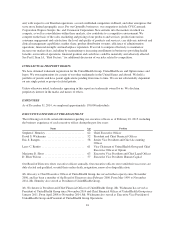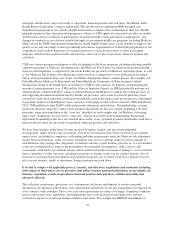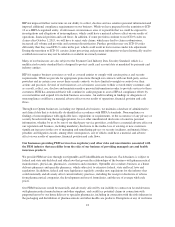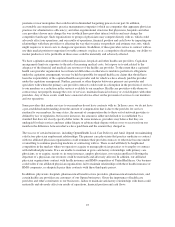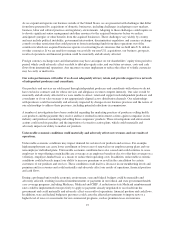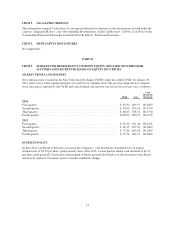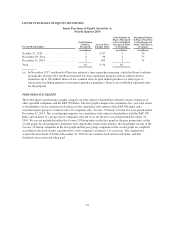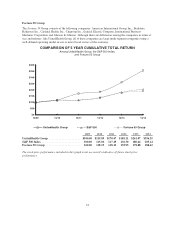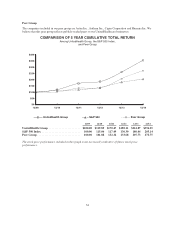United Healthcare 2014 Annual Report Download - page 26
Download and view the complete annual report
Please find page 26 of the 2014 United Healthcare annual report below. You can navigate through the pages in the report by either clicking on the pages listed below, or by using the keyword search tool below to find specific information within the annual report.delivery or specialty pharmacies due to an accident or an event that is beyond our control could affect our ability
to process and dispense prescriptions in a timely manner and could materially and adversely affect our results of
operations, financial position and cash flows.
In addition, our PBM businesses provide services to sponsors of health benefit plans that are subject to ERISA.
The DOL, which is the agency that enforces ERISA, could assert that the fiduciary obligations imposed by the
statute apply to some or all of the services provided by our PBM businesses even where our PBM businesses are
not contractually obligated to assume fiduciary obligations. In the event a court were to determine that fiduciary
obligations apply to our PBM businesses in connection with services for which our PBM businesses are not
contractually obligated to assume fiduciary obligations, we could be subject to claims for breaches of fiduciary
obligations or claims that we entered into certain prohibited transactions.
If we fail to compete effectively to maintain or increase our market share, including maintaining or
increasing enrollments in businesses providing health benefits, our results of operations, financial position
and cash flows could be materially and adversely affected.
Our businesses compete throughout the United States, Brazil and other foreign markets and face significant
competition in all of the geographic markets in which we operate. In particular markets, our competitors,
compared to us, may have greater capabilities, resources or market share; a more established reputation; superior
supplier or health care professional arrangements; better existing business relationships; lower profit margin or
financial return expectations; or other factors that give such competitors a competitive advantage. In addition, our
competitive position may be adversely affected by significant merger and acquisition activity that has occurred in
the industries in which we operate, both among our competitors and suppliers (including hospitals, physician
groups and other care professionals). Consolidation may make it more difficult for us to retain or increase our
customer base, improve the terms on which we do business with our suppliers, or maintain or increase
profitability. Additionally, new direct to consumer business models from competing businesses may make it
more difficult for us to directly engage consumers in the selection and management of their health care benefits,
health care usage, and in the effective navigation of the health care system we may be challenged by new
technologies and market entrants that could disrupt our existing relationship with health plan enrollees in these
areas. Our business, results of operations, financial position and cash flows could be materially and adversely
affected if we do not compete effectively in our markets, if we set rates too high or too low in highly competitive
markets, if we do not design and price our products properly and competitively, if we are unable to innovate and
deliver products and services that demonstrate value to our customers, if we do not provide a satisfactory level of
services, if membership or demand for other services does not increase as we expect or declines, or if we lose
accounts with more profitable products while retaining or increasing membership in accounts with less profitable
products.
If we fail to develop and maintain satisfactory relationships with physicians, hospitals and other service
providers, our business could be materially and adversely affected.
Our results of operations and prospects are substantially dependent on our continued ability to contract with
physicians, hospitals, pharmaceutical benefit service providers, pharmaceutical manufacturers, and other service
providers at competitive prices. Any failure to develop and maintain satisfactory relationships with health care
providers, whether in-network or out-of-network, could materially and adversely affect our business, results of
operations, financial position and cash flows. In addition, certain activities related to network design, provider
participation in networks and provider payments could result in disputes that may be costly, distract
managements’ attention and result in negative publicity.
In any particular market, physicians and health care providers could refuse to contract, demand higher payments,
or take other actions that could result in higher medical costs, less desirable products for customers or difficulty
meeting regulatory or accreditation requirements. In some markets, certain health care providers, particularly
hospitals, physician/hospital organizations or multi-specialty physician groups, may have significant market
24




